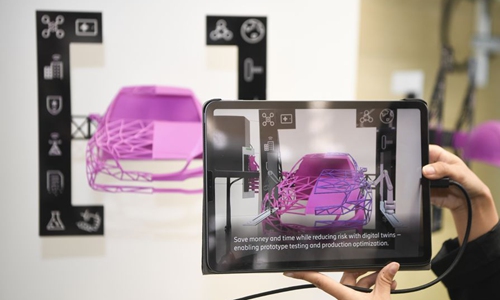HOME >> SOURCE
China's mobile telecom carriers launch 5G messaging service
Source:Global Times Published: 2020/4/8 14:18:40

A staff member demonstrates an application of industrial Internet of Things at the China Mobile (Beijing) 5G+ client experience center in Beijing, capital of China, Sept. 25, 2019. (Xinhua/Wang Quanchao)
China's three major mobile telecom carriers have jointly issued a white paper on a 5G messaging service, witnessed by 11 telecommunications technology firms on Wednesday. Analysts said the service could be the first commercialized 5G application.
The 5G messaging service, jointly launched by China Mobile, China Unicom and China Telecom, will allow subscribers to book air flights, make payments and shop through their mobile phone's basic messaging app without downloading additional service apps.
"It's phenomenal that all three major carriers are launching a business together. That's something that hasn't happened for a long time, not to mention the ecosystem that will be formed around China's growing 5G services," Ma Jihua, a Beijing-based tech industry analyst, told the Global Times.
According to the white paper, an ecosystem will be built involving mobile operators, telecommunications equipment makers, platform providers, AI technology developers and mobile devices manufacturers.
The ecosystem will involve a wide range of entities in the telecommunications industry including Huawei, ZTE, Xiaomi, Samsung and Hisense.
Huawei announced on Wednesday that it would commercialize the 5G messaging service in June, followed by ZTE which announced commercialization would take place in late June.
Cooperation among the carriers has been realized through the Rich Communications Suite (RCS), a new generation of international standards for messaging services. RCS integrates and enhances the basic information business with the goal of achieving a unified global information service solution and ensuring consistent business connectivity and user experiences among operators.
RCS had been proposed by several operators for years, but had never been used because of fragmentation in its operation. More importantly, methods of pure person-to-person communication were well established in the 3G and 4G eras. The development of new methods has had to wait until the 5G era, Ma noted.
"In recent years, everyone has been talking about new retail, new finance, new energy, and new logistics. Now here comes real new infrastructure. In short, in the new era represented by the digital economy, a new era of social communication wave has begun," said Ma.
In 2019, global monthly active RCS users hit about 286 million with more than 169 RCS operators around the world, and that is expected to rise to 486 by 2023, according to industry data.
"New infrastructure involves various fields including 5G, the industrial internet and AI, which all require a specific application to combine technologies together into a system, which can be realized through RCS," said Ma.
Posted in: INDUSTRIES